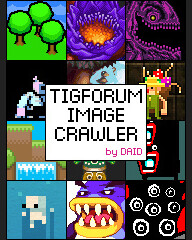PAX 2010: Solace
By: Derek Yu
On: September 9th, 2010
[This is a guest review by NMcCoy. If you’d like to contribute an article for TIGSource, go here.]
So, I just got back from my day at PAX. There was all sorts of delightful stuff on display, fun things to do, and some very impressive demos in the expo hall. The one game that I was utterly blown away by, however, was not LittleBigPlanet 2 or Duke Nukem Forever or Final Fantasy XIV, but a student game in the PAX 10 called Solace. Something that’s been on my mind lately is the fact that while games, as a medium, have certainly been explored as a vessel for expressive artistic statement, gameplay has not often been a part of that. If you take Braid and remove the text, you end up with a puzzle game involving time manipulation that is barely about anything other than puzzles involving time manipulation. On the other hand, if you took Solace, removed the text, and replaced all the beautiful graphics and superb sound design with rectangles and beeps, it would still be about the five stages of grief as represented through the gameplay of its levels – the message would not be conveyed nearly so brilliantly, but nor would it be lost.
Certainly, there have been games in the past that conveyed an artistic statement through their gameplay. Passage springs immediately to mind, for example. But the thing about Passage is that while it may or may not be effective as art, it isn’t really effective as a game. It merits exploration, and provokes thoughts, certainly, but doesn’t really engage the player on a visceral level. In contrast, Solace is fun, challenging, and engaging. The visuals, audio, and level design are all deliberately tuned to evoke within the player echoes of the emotion that they represent. Not just through sympathetic sensory associations, the way a painting or poem or piece of music would – though Solace uses these idioms as well – but through the nuances of the gameplay. The structure of the game expects, and at times effectively requires, the player to demonstrate an understanding of the level’s relevant emotion in order to successfully proceed through the game – and indeed enables the player to do so, with nothing more nuanced than a directional control and a fire button.
Solace, in addition to being a marvelous work of art in its own right, is a lesson to all game designers of what games have the potential to be. In my own game designs, I have often run into a tension between making my game artistically meaningful and having good, solid, fun gameplay. Solace, by being excellent in both regards, has taught me that this is a false dichotomy. If Portal is worthy of a place on a course syllabus, I believe Solace can be similarly instructive, to students and designers alike.
-
rinkuhero
-
Magnafiend
-
Mike Hunt
-
Dodger
-
divit
-
Magnafiend
-
Dodger
-
anarkex
-
Guest
-
Zecks
-
Dodger
-
AshfordPride
-
Dodger
-
AshfordPride
-
AshfordPride
-
Guest
-
Dodger
-
anarkex
-
Dodger
-
Dodger
-
Chris
-
http://www.derekyu.com Derek Yu
-
AshfordPride
-
AshfordPride
-
http://www.derekyu.com Derek Yu
-
AshfordPride
-
Dodger
-
rinkuhero
-
Magnafiend
-
Dodger
-
Dodger
-
Chris
-
SirNiko
-
Ethan
-
[:O)
-
PHeMoX
-
Dodger
-
alastair_jack
-
Billybob
-
Mike Hunt
-
ghost4
-
Mike Hunt
-
Ronnie James Dio
-
somes
-
Dodger
-
Dodger
-
somes
-
twincannon
-
twincannon
-
twincannon

